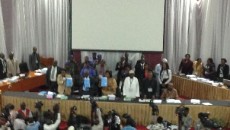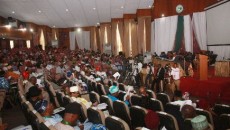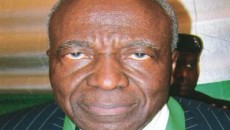He doused fears about the possible non-availability of kerosene in an event of subsidy removal and expressed firm belief that the product would be available.
The Nigeria National Petroleum Corporation, NNPC, on Thursday met with members of the Committee on Power at the ongoing National Conference to restate its call for the removal of subsidy from petroleum products in the country.
The NNPC’s delegation, led by the Head of Strategy Planning, Tim Okon, who spoke on the economics of crude oil production, also reiterated the call for international collaboration to tackle illegal crude oil trade.
Mr. Okon expressed concern over the activities of itinerant crude oil refiners who degrade the environment, pointing out that there was no difference between stolen and legitimate crude.
He said the continued implementation of the fuel subsidy regime in the pricing template of petroleum products amounted to over N2 trillion drain on the nation’s resources.
The official also suggested the deferment of the about 300,000 barrel of crude oil per day for refining, while advocating the payment of environmental surcharge, inclusion pipeline tax of about N6 into the cost of PMS, as well as the implementation of the five per cent road maintenance charge.
He doused fears about the possible non-availability of kerosine in an event of subsidy removal and expressed firm belief that the product would be available.
Crude oil traders, he noted, were a veritable link between oil thieves and legitimate businessmen.
Stolen crude, according to him, goes through the creeks, with such activities taking place mostly at night, with the aid of small vessels that help transfer crude oil into large ships anchored on international waters.
Mr. Okon lamented that the issue cannot be tackled in isolation (by Nigeria alone) because of its international dimension, hence the call for international collaboration involving the use of helicopters and gunboats on international waters.
He, however, stated that to stem the twin evil of pipeline vandalism and crude oil theft, a dedicated pipeline protection unit, as obtained in Russia, must be in place.
The NNPC, he said, has six main creeks in which barges operate, saying it would require the procurement of six coastal vessels to effectively police those creeks.
He added that the recent meeting between President Goodluck Jonathan and the US Assistant Secretary of Defence was part of government’s efforts to curtail crude oil theft and vandalism.
He traced the current energy crisis Nigeria was suffering to the country’s export of crude oil, the primary energy source, and importation of processed Premium Motor Spirit, PMS, popularly called petrol.
For Nigeria to reach the level of South Africa, Mr. Okon said the nation needed to generate about 50,000 megawatts, MW, of electricity, as opposed to the current 4,000 MW.
He said the Gas Master-plan by the federal government suffered a setback because international oil companies did not see Nigeria as a viable market for gas.
On the nation’s over-reliance on its natural resources as income, especially oil and gas, Mr. Okon emphasized the need for more utilization of oil and gas at home, as these constitute about 15 per cent of the nation’s gross domestic product, even though it constitutes about 85 per cent of government revenue.
On ways government can generate revenue, he warned of a situation where there was complete reliance on a product whose price cannot be determined or controlled locally.
While indicating that the unit cost of producing a barrel of crude oil was approaching $39, Mr. Okon said the Nigeria LNG currently exports 22 million tons of gas per annum from six trains.



